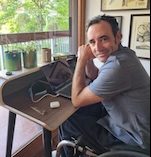We continue our Auto / Bio / Fiction series of talks and seminars with Guido Mazzoni, of the University of Siena, and writer Jarred McGinnis, in conversation with Natasha Bell.
9 February 2023, 17:30 UTC (online)
THIS EVENT HAS BEEN CANCELLED DUE TO UCU STRIKE ACTION ON 9 FEBRUARY 2023.
THE SPEAKERS WILL BE RESCHEDULED TO NEW DATES. DETAILS WILL BE PUBLISHED AS SOON AS THEY HAVE BEEN FINALISED.
ALL THOSE WHO HAD ALREADY BOOKED TICKETS HAVE BEEN CONTACTED BY EMAIL.
WE APOLOGISE FOR THE INCONVENIENCE.
The next seminar on 9 March 2023 will be unaffected by the strike and should go ahead as normal, please join us for that!
Guido Mazzoni, “Like everyone else. Annie Ernaux’s The Years”

In this talk I will discuss Annie Ernaux’s The Years (Les Années, 2008), a text for which Ernaux invented a new way of understanding autobiography by mixing personal history and collective history, speaking impersonally or in the first person plural, and reinventing the use of tenses.
The Years is both a collective historical novel and Ernaux’s personal search of lost time: “a slippery narrative composed in an unremitting continuous tense, absolute, devouring the present as it goes, all the way to the final image of a life […]: a sort of impersonal autobiography”, as we read in the last pages of the book.
Jarred McGinnis, “Alchemizing the self for fiction”
 Question: What’s worse than being in a wheelchair?
Question: What’s worse than being in a wheelchair?
Answer: Being a fuck-up in a wheelchair.
After a car accident Jarred discovers he’ll never walk again. Confined to a ‘giant roller-skate’, he finds himself with neither money nor job. Worse still, he’s forced to live back home with the father he hasn’t spoken to in ten years.
Add in a shoplifting habit, an addiction to painkillers and the fact that total strangers now treat him like he’s an idiot, it’s a recipe for self-destruction. How can he stop himself careering out of control?
As he tries to piece his life together again, he looks back over his past – the tragedy that blasted his family apart, why he ran away, the damage he’s caused himself and others – and starts to wonder whether, maybe, things don’t always have to stay broken after all.
The Coward is about hurt and forgiveness. It’s about how the world treats disabled people. And it’s about how we write and rewrite the stories we tell ourselves about our lives – and try to find a happy ending.
(From the back cover of The Coward)
After reading from his work, Jarred McGinnis will be in conversation with Natasha Bell.
This seminar will be chaired by Carole Sweeney.
Attendance is free but booking is required to receive a link to attend. (The Zoom link will be sent shortly before the event itself: check the email with which you registered.)
The participants:
Guido Mazzoni is Professor at the University of Siena. He has been a fellow at the École Normale Supérieure, Paris (1994-1995), Lecturer at University College London (1995-96), Fulbright Visiting Scholar at the University of Chicago (2003-04), Italian Affiliated Fellow at the American Academy in Rome (2007), Visiting Professor at the École Normale Supérieure, Paris (2010), University of Chicago (2011), Scuola Normale Superiore, Pisa (2016), and University of California, Berkeley (2016), and Fellow at the Italian Academy, Columbia University, New York (2018). He teaches at the Molly Bloom Creative Writing School in Rome and at the Master School in Creative Writing at IULM, Milan.
He is the author of three books of poetry, La scomparsa del respiro dopo la caduta (in Poesia contemporanea. Terzo quaderno italiano, edited by F. Buffoni, Guerini, 1992), I mondi (Donzelli, 2010), La pura superficie (Donzelli, 2017), and Grammaire. Choix de poèmes 1997-2017 (Alidades, 2019). His books of literary theory and criticism include Forma e solitudine (Marcos y Marcos 2002), Sulla poesia moderna (Il Mulino, 2005) (French translation: Sur la poésie moderne, Garnier Classiques, 2014; new English version On Modern Poetry, Harvard University Press, 2022); Teoria del romanzo (Il Mulino, 2011) (English translation: Theory of the Novel, Harvard University Press, 2017); and I destini generali (Laterza, 2015).
Jarred McGinnis was chosen by the Guardian as one of the UK’s ten best emerging writers. His debut novel The Coward was selected for BBC 2’s Between the Covers, BBC Radio 2’s Book Club and listed for the Barbellion Prize. The French edition was selected for numerous prizes including the prestigious Femina. He also has a PhD in Artificial Intelligence, but mostly he inspires the able-bodied by using public transport and taking his daughters to the playground.
Natasha Bell is an author and PhD student at Goldsmiths. Through practice-led research, she’s exploring the purpose and ethics of autofictional examinations of the writing self. Her novels This Nowhere Place (2021) and His Perfect Wife (2018) are published by Penguin, and she teaches Creative Writing for City Lit, Jericho Writers and the Faber Academy.
Carole Sweeney is a Reader in Modern Literature in the Department of English and Creative Writing, Goldsmiths. Her research and teaching focuses on the intersections of gender, sexualities, race and class in modern and contemporary literature, with a special interest in contemporary feminist life-writing and the work of Ann Quin, Anna Kavan, Eva Figes, Brigid Brophy, Nancy Cunard and Christine Brook-Rose. She is the author of three monographs – Vagabond Fictions: Gender and Experiment in British Women’s Writing: 1945-70; Michel Houellebecq and the Literature of Despair and From Fetish to Subject: Race, Modernism and Primitivism (1919-1935). Her current book, Your Body is Still A Battleground: Ethics, Aesthetics and Embodiment in Contemporary Feminist Writing, examines the embodiment of life-cycles in women’s writing and is forthcoming in 2024. She is co-Chair of the CHASE Feminist Research Network and Associate Editor of the Journal Contemporary Women’s Writing.
